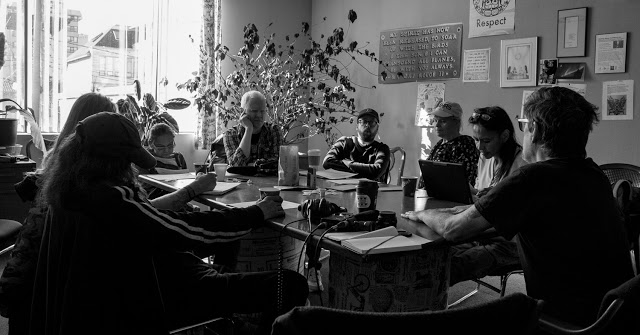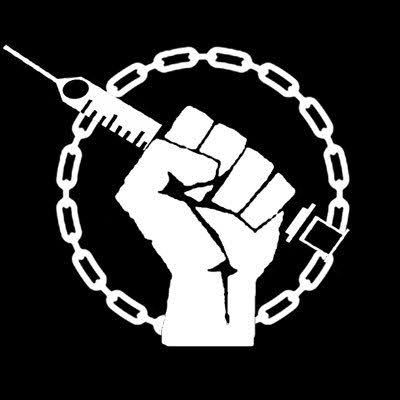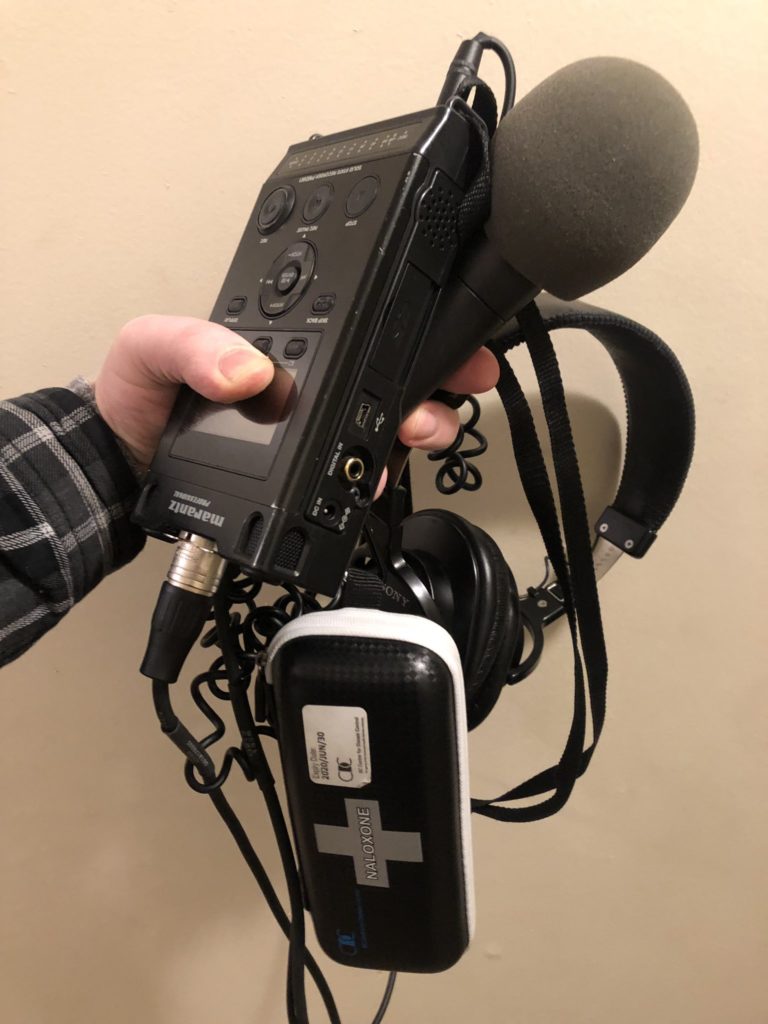“Is anyone else feeling our desperate sense of urgency?”
That’s the first question Garth Mullins, the host and executive producer of the Crackdown podcast, asks his listeners in the very first episode. Urgency borne of the overdose crisis; urgency connected to tens of thousands of preventable deaths; the urgency of tragedy, of losing dozens of friends because of bad drug policies.
“The overdose crisis is so often covered like a force of nature, like destructive hurricane or a big flood,” said Mullins. “But we always try to return to the fact that it’s intentional, like a war.” The podcast is permeated with an urgency that’s contagious, transmitted one episode at a time, building as the weeks and months pass.
Crackdown has everything that makes a podcast great: character driven storytelling backed up by exhaustive research; impeccable pacing and gorgeous, stereo soundscapes; an original score with lots of music seeping its way into the segments; and a frank narrator with a powerful personal story.
And when the microphones are off, Crackdown goes beyond the already high standards of the best narrative podcasts: the core of the editorial collective is made up of drug users, folks directly affected by the overdose crisis. Together, they decide what should be covered and how. They are war correspondents, and the war is against them and the people they love.
Funding for the show comes from academic grants and individual donors, ensuring no resources are diverted from frontline work. Everyone who works on the podcast, even if just to show the team through their building, is compensated at a rate nearly double Vancouver’s living wage.
The name of the podcast refers first to state policy, and second, to the way users in Vancouver refer to crack and heroin (down). “Crackdown is what the state does, what the police do, to communities, to drug users, and in Canada there’s just been one, long, escalating crackdown for more than a century,” said Mullins.

I began listening to the Crackdown podcast on a Sunday, and by Wednesday I’d burned through the first eight episodes, back to back to back. Tales of incredible hardship, discrimination, death, and violence, shot through with determination, humor and struggle.
The next day I set up an interview with Mullins. When we finally chatted, it was a warm fall afternoon in Vancouver, before the damp, dark days of winter. He’d spent the morning in a meeting, I could hear the distinctive beeping and hiss of downtown Vancouver’s kneeling busses as we spoke.
Our conversation lasted nearly two hours. We swapped memories about where we first met (at a protest against APEC in 1997) to the last time we ran into each other (randomly, on the street, in Baja California Sur). What follows is part of what we discussed, edited for clarity and brevity.
•••
DP: Can you help us understand how the opioid crisis is structured by overlapping logics of prohibition and capitalism?
GM: The way capitalism is organized, it regulates our bodies a lot. Our bodies are regulated for work. And the way transportation systems are set up, at least where we are, it’s all about production. And all kinds of different efforts about drugs and alcohol are also organized around production.
I remember, when I was younger I worked in a gold mine on the Arctic Circle, up in the north of Canada, way north. And you weren’t allowed to bring booze in there. It was so far north there was no towns near there, so they fly you in in a little plane, you go to work for two weeks or six weeks of shifts up there, and they’ll search ya to make sure you’re not stealing gold and bringing in beer.
So of course, you’d work 12 hour shifts up there, sometimes you wouldn’t see the sun for a long time. Let’s just say, you wanted a fuckin’ beer after work. But it wasn’t allowed. So everyone had cocaine. Because they wanted everyone safe, and functional and ready for work, and they though workers couldn’t be trusted around beer, there was no beer.
This mine ran 24/7, 365 days a year to produce gold. Beer was seen as having the possibility to put bumps into production, if people were hung over or whatever. So everyone had cocaine. They made something worse happen, or something that could potentially be much more disruptive, and much harder on people because its criminalized and you’d be fired on the spot if you were found with drugs.
I just think about that type of scenario, all around the world. Production is internationalized, it’s everywhere. To end the drug war, we have to start thinking about more democracy for workers. We need a system that puts more power in the hands of workers, and that doesn’t organize just around producing profit at the top.
Maybe this sounds a little esoteric but the flip side of this is that when our lives are organized to basically be in a giant factory, it’s really alienating. We get cut off from our regular communities and our families, you know, our lives get consumed by work that we don’t care about, and so of course, you wanna get fucked up. You want to do something to not feel that all the time.
You add on top of that like the climate emergency and emerging authoritarianism around the world… I don’t know how people actually survive without a nice cushion of opiates under them. I just think that to really get out of the drug war, we have to rethink the things that are driving us towards it from all kinds of angles.
DP: Can you talk more about how you see the drug war playing out internationally, and what a way out of it might imply?
GM: The drug war is a very asymmetrical war. On one side is the most well financed army on earth, a collection of states across the world that have interlocking agreement and militaries, huge surveillance capacity, and lots of spaces to lock us up. And then on the other side, there’s people who are marginalized and who are mostly not organized at all, never mind into institutions like that.
I guess the way to peace is that they have to take apart the laws and structures that allow that great army to walk the world. Here in Canada, we have to take apart those pieces of legislation that say ‘using this substance is illegal,’ or whatever. Internationally we have to start pulling that apart too. The things that come to replace these structures will determine the kind of peace we experience.

DP: That’s an incredible vision, and nothing short of revolutionary. That said, having a safe supply of narcotics is one of the concrete policy changes you come back to repeatedly in the podcast. It seems like it could make a big difference in the short term. Can you talk about this much more immediate horizon of struggle?
GM: A safe supply of drugs, drugs that are regulated and assured by the state, instead of ones that are unregulated and suppressed by the state, is a reform that’s easily winnable. You can get most drugs that you’d need at a pharmacy right now, just about anywhere in North America, so it’s not really that big of a stretch.
We’ve also seen it before in history. The prohibition of hard drugs is a relatively recent thing, and even during that time, we’ve seen prescription heroin for decades in the United Kingdom, in other places in Europe, and there’s a pilot project here. It’s possible.
A safe supply of drugs is not something that we need to have a revolution and demolish capitalism for. It is something we can do on the way to that. It seems to me to be more easily winnable and it would certainly stop the overdose deaths in their high numbers. It would lower overdoses dramatically, overnight.
DP: Can you talk about how we could get to a safe supply? How is the government in Canada is standing in the way of this simple reform that would save so many lives?
GM: Governments and parties will never do anything if there isn’t pressure on them from below. You can put some pretty nice people at the heads of parties, and it doesn’t make a difference. There’s structural forces that are acting here. The status quo has a very strong momentum.
The fact is, we’re not all that well-organized as drug users, and as people affected by the overdose crisis. In Vancouver it is slightly better than some other places, here we have a drug users union, and there are other efforts, but it is very small. That’s the challenge: to organize enough so that you put costs on politicians for not having a good program on drugs. Like in many other struggles, we have to embarrass, force and pressure the government into handing down any of these reforms.
You kind of have two mainstream schools of thought in Canada: from the center and from the right. And that’s basically who gets to govern the country, who has always governed the country. There’s never been a national government that’s social democratic here.
And so the two schools of thought are, ‘we don’t care if drug users die,’ from the center, and on the right, ‘you know, we’re kind of happy if drug users die.’ It’s hard to make progress with those.
DP: What’s happening at the more local level in terms of political shifts related to prohibition?
GM: Back in the day people used to hate drug users, and they would be very proud to talk about that. You knew who your enemy was right away. And there’s still lots of people like that, like Ontario Premier Doug Ford and Alberta Premier Jason Kenney. There’s still lots of people who are willing to say to us, ‘just go off and die.’
But there are people in the middle now who actually don’t want to spend the political capital or do anything dramatic. So that means they will allow the overdose crisis to continue, but they say very warm things, like ‘we’re your friend, and we’re really worried about this stuff,’ and they basically gaslight drug users. Most people I know who are wired don’t really have much faith in those kinds of things, but the rest of the electorate, they listen and they think ‘oh, that’s great, this Prime Minister or this Premier doing something about this, I hope this works.’
So that makes organizing more difficult for us, because we have to parse through all the rhetoric. If some guy on the right says, ‘fuck you’ to drug users, you can just point to that, its pretty easy. I’m not saying I would prefer the right. Absolutely not. But it’s the gaslighting, the liberal gaslighting, that becomes so difficult to organize around.
DP: You’ve talked a little about how drug users are approached by the political elite, by politicians in all levels of government. Can you talk about the continuities and maybe some of the differences between the overdose crisis in Vancouver in the 1990s and what’s happening today?
GM: I was an injection heroin user all the way through the first overdose crisis. I lost a lot of friends in the 1990s. But I was not a drug user activist. I wasn’t secretive about my drug use, but I didn’t really advertise it, which is basically what I do now. I wasn’t really reflecting on the policy, as much. But you still were able to see the toll it took.
It didn’t really come into my consciousness until maybe 2014 or so, I almost can remember it to the day. I was standing in Oppenheimer Park, and I saw a bad dope poster, a warning about bad drugs that were going around, in fact I had just learned of a couple of overdoses. I heard sirens ringing out and I was like, this is really familiar. I had that awful deja vu feeling.
I started remembering the nineties, and I felt like I was standing on the edge of a cliff and having vertigo: like I was about to fall into something else. This time the overdose crisis has been worse than the nineties by a lot. It’s gone much further. It’s not just Vancouver thing, it’s not just North America. It’s become almost worldwide.
An important connection with events today is that back then, we had just came out of the 80s, and so there was an effort to crack down on heroin. What we got from that was stronger heroin, which was called China White. And then there was a big effort to crack down on that, and we wound up with Fentanyl. Now there’s an effort to crack down on that, and that’s gonna bring us Carfentanyl. It’s just like an arms race.
I’ve seen it play out in my lifetime. I’ve seen how much stronger dope has gotten in the couple of decades that I’ve been in the mix on that stuff. It really shows how police and government agendas are driving us to the next epidemic, the next overdose crisis.

DP: There’s different moments in Crackdown where you’re openly making demands, or urging listeners to act, and it’s really very powerful. I wanted to ask you what kind of activism and organizing is inspiring you these days?
GM: We need to learn from the lessons of Act Up, who were organizing during the big AIDS crisis in the late eighties and early nineties. They went through the same sort of thing of trying to stigmatize a group of people, trying to get the attention of the authorities in an epidemic where they were being killed, and they weren’t always polite, they were sometimes very in your face, and that’s really good, and we have to remember that.
But we also have to learn how we manage to keep going. Act Up lost so many of their members and leaders and organizers and that’s what’s happening to us. As a social movement its really disorienting and disorganizing, you find yourself in kind of a triage and kind of a reactive footing.
You’re trying to protect your own members or you’re organizing memorials, you’re losing people, and you have to always try and remember to get on that footing of where you’re actually trying to go, rather than just treading water. So how Act Up did that is really inspiring. I’m trying to keep my ears open to that. I know that to the extent that we’ll win rights, we’ll do it by treading the same path that loads of people who have come before have walked.
DP: What’s next on Crackdown?
GM: For the ninth episode, we did a bunch of investigative research into why the government switched to this big pharma formulation of methadone that was so troublesome for so many people. We did Freedom of Information requests and got a bunch of files from the government, of course they censored most of them, we’re putting together a story using a bunch of different data points, but what’s emerging is quite dramatic. It’s sort of like a follow up to Episode two.
In November I’ll go to Scotland and meet people there. Scotland is having an overdose crisis right now, the numbers in that country are not so far away from what’s happening in British Columbia, and the population size isn’t so different. And they also had an HIV crisis in the late 80s and the 90s, in the same way we did in Vancouver.
•••
Garth and I chatted a little more before we hung up so that he could make his way to a community meeting on harm reduction. When I asked him how readers or listeners could support Crackdown, he was unequivocal: “Use this to organize!” he said. “Don’t support us, support yourself in your own community.”
Crackdown is available wherever you listen to podcasts, and the show’s website is filled with links to resources about the overdose crisis. Folks with coin to spare can support the podcast via Patreon.
